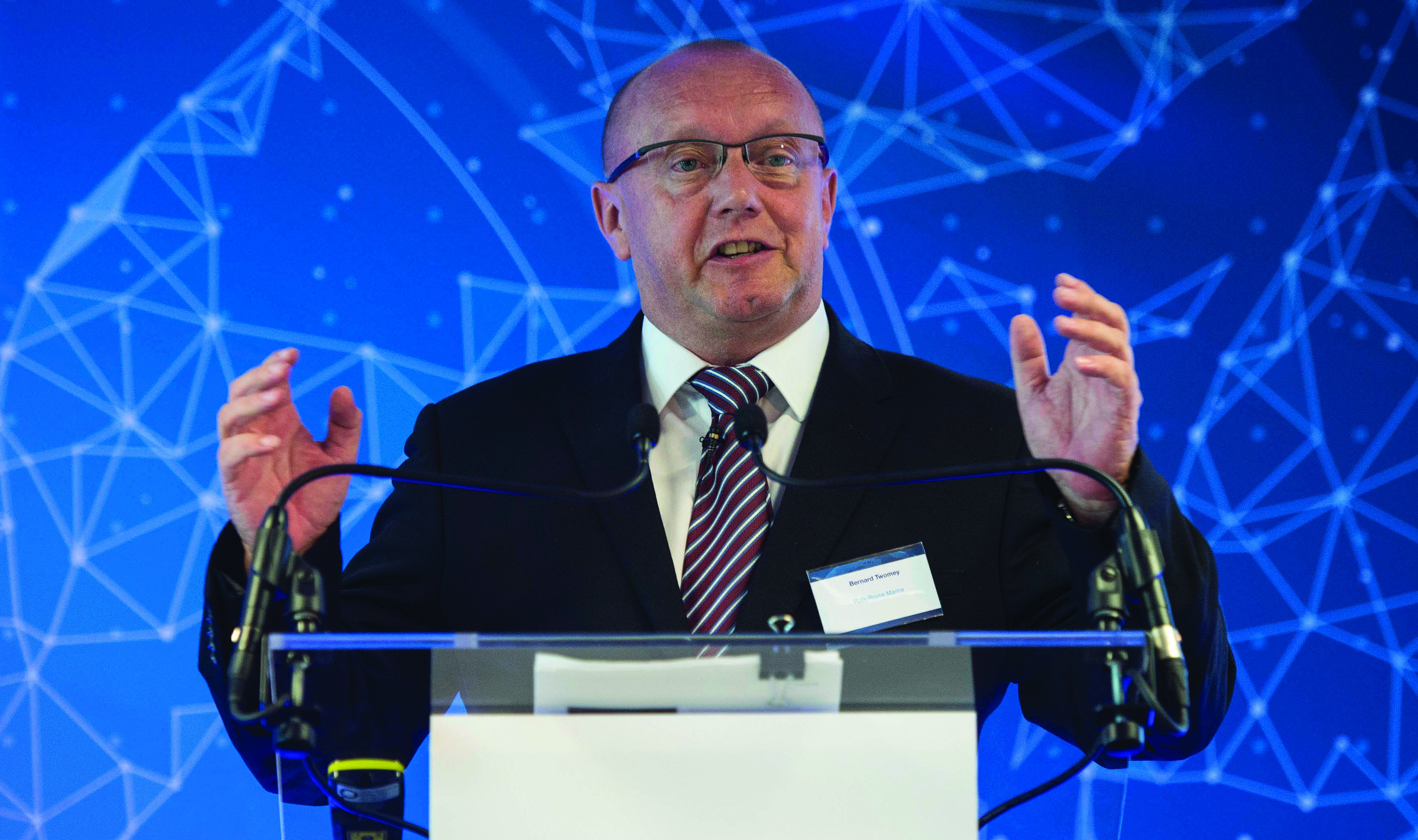- Topics
- Campaigning
- Careers
- Colleges
- Community
- Education and training
- Environment
- Equality
- Federation
- General secretary message
- Government
- Health and safety
- History
- Industrial
- International
- Law
- Members at work
- Nautilus news
- Nautilus partnerships
- Netherlands
- Open days
- Opinion
- Organising
- Podcasts from Nautilus
- Sponsored content
- Switzerland
- Technology
- Ukraine
- United Kingdom
- Welfare
What will an automated shipping industry of the future mean for seafarer training?
29 August 2018

As the shipping industry moves towards automation and remote operation, what will this mean for seafarer training? Will there even be seafarers in future? ANDREW LININGTON reports from a conference tackling the big questions...
Seafarer training and qualifications will need to be radically reformed to reflect the rapid advances in shipboard technology, a 'smart shipping' conference heard.
Delegates attending the two-day event organised by City of Glasgow College were told that a new breed of specialist officers will be required to operate and maintain the increasingly complex systems being introduced into the industry.
Opening the event, college principal Paul Little said that smart shipping is likely to be more disruptive than containerisation, with automation posing a major challenge to maritime education and training.
There is huge potential for the digital revolution to improve society, he added, but much will depend on how technology embraces the human element. 'We must recognise that the technology is there to serve us, and not us to serve the technology. It is about our ability to control the smart world and not to be controlled by it.'
Then UK Chamber of Shipping chief executive Guy Platten said he did not regard autonomous ships as sounding the death knell for seafarers. 'The world will always need maritime skills,' he told the conference. 'The idea that it can all be delivered by computers is false.
'But things will change and we need to understand what that will be and how to prepare for it,' he continued. 'Crews that will go to sea in future will need to do more and know more, and they may need to be analysts and systems specialists.'
Mr Platten said the UK needs to get moving quickly, as other countries are already well ahead. 'The countries that don't produce that technology will miss out,' he warned. 'It's not good enough to say we are a world leading maritime nation – we have to prove it,' Matthew Crane, from the Department for Transport, said the government is determined that the UK will remain a global maritime leader – and it is due to produce a 'route map' by the end of this year to set out the strategy for smart shipping.


Petar Modev, head of ship inspections with Thomas Miller P&I, said the role of seafarers is changing to one involving increasing monitoring and high-level decision-making.
However, he pointed out, the interaction between crew members and components – and notably complex software-intensive systems – is often a key factor in shipping accidents.
'In respect of system safety, the shipping industry has a long way to go – especially when compared with other industries,' he said. 'If we can make the systems safer with people onboard, that would be a step forward for autonomous ships.'
Graham Wagstaff, technical simulation business manager with Wärtsilä Voyage Solutions, said shipping must do a much better job of dealing with 'the great sea of data' in which it operates if autonomous vessels are to by 'digital spaghetti' – with poorly connected systems made by a wide range of different companies and covered by a number of different regulatory authorities.
Mr Wagstaff said he was constantly astounded by the technology onboard some vessels – and cruiseships in particular – but when things go wrong there often appeared to be a conflict between the chief engineer and the electro-technical officer about who is responsible for fixing things. 'We need a third specialist officer who can deal purely with the automated systems on ships, and the colleges need to drive this forward.' he argued.
Bernard Twomey, from Rolls-Royce Marine, said there is already an extensive range of technology to support shipping – including 'intelligent awareness' systems using Lidar, sensors and cameras to provide real-time advice to seafarers.
But there is a big regulatory challenge that inhibits the introduction of smarter ships, he suggested. 'I don't believe the International Maritime Organisation will have sole legal jurisdiction, as it is not all about ships,' he explained. 'The human controlling things will no longer be a seafarer, but an operator in a remote centre, and we need to join up the legal requirements for those people.
'This may be the last generation of people who step onboard ships, and the people working in the new environment are going to need new skills – and those skills may not necessarily align with the current skills base,' Mr Twomey argued. 'We need to ask what tasks are required to operate, maintain and diagnose those systems safely and what you need to do to fill the gap.
Nautical Institute chief executive John Lloyd agreed that regulators are struggling to keep pace with the rapid rate of technological progress, and rather than relying on the IMO, the industry should collaborate to develop new standards and skillsets.
Future seafarers will need to be highly computer literate, with strong analytical skills and well-tuned critical thinking and problem-solving abilities.
To support this, the learning environment must be innovative and flexible, Capt Lloyd argued, and the regulatory regime needs to be responsive to the industry's changing needs. 'However, when we look to the future we should not forget that we have some real problems to face today – such as the hazards associated with mooring ropes.'
Former seafarer Dr Chris Haughton noted the 'extremely powerful drivers' for automation in shipping. 'But the negatives can be degraded manual skills, ineffective monitoring, incorrect situational awareness, and overreliance on technology.'
The psychological factors linked to increased automation need deeper consideration, he argued, and patterns and trends should be analysed to help prevent problems.
Smart shipping requires smart thinking, Dr Haughton said, but the industry's ever increasing adoption of codes, protocols and checklists is creating dull thinking. Oldfashioned and outmoded training – including the teaching of redundant skills to young seafarers – is also fuelling a disconnect between training and what is actually being done on ships, he warned.
Dr Haughton said he was disturbed by the 'dystopian future' set out in some visions of the coming decades, with crews increasingly overseen by shore-based fleet operation centres. 'How will we motivate tomorrow's generation of seafarers to go to sea when they are subjected to such extreme control?' he asked.
V-Ships cadet training manager Lee Clarke said the industry should consider what the officer of 2050 will be like – and change the curriculum well ahead of this to ensure a clear pathway for integrating emerging technologies and ensuring that the right candidates are found.
'If we fail, I fear we will find ourselves on the back foot and that will place cadets at a disadvantage,' he added.
Future cadets are likely to be very different from today's, Mr Clarke suggested, and they will need new skills and attributes. However, he warned, the industry needs to be proactive to avoid the risk of traditional skills of navigation and collision avoidance from being dangerously diluted.
'The role of the remote operator is likely to be filled by mariners – current cadets – but they may be people with no seagoing experience in the future,' he said. 'We need to make sure that seafarers are trained in such a way that they can adapt to these changes and face these challenges.'
To achieve this, Mr Clarke said, attention should be paid to the future of maritime colleges and the role of simulators, virtual reality and augmented reality in 'The traditional cadetship will need to be rethought and redefined for 2050,' he argued. 'Planning now for the future is vital in order for UK training colleges to lead the world, and if we can future-proof our colleges we can future-proof our cadets as well.'
'Technology and globalisation are driving the greatest changes in the maritime industry since the shift from sail to steam 150 years ago,' said Rear Admiral Michael Alfultis, president of the State University of New York Maritime College. 'But we need not fear automation.
The overall number of jobs may increase, and while it may replace low-skill jobs, more higher-skill roles will be created, which will all pay more.'
Maritime education institutions need to be agile and nimble in an age of accelerating technological advance, he added. Courses must be kept relevant and colleges should be proactive rather than reactive in dealing with change.
'It's time to move away from competence-based prescriptive training to more educational processes,' Rear Admiral Alfultis argued. 'Training is just for a job – education is for a career.'
While seafaring is sure to change dramatically, Rear Admiral Alfultis predicted that it will still appeal to a new generation. 'Young people will embrace the idea of working with lots of technology and not going to sea,' he concluded.
But Capt Lloyd suggested it may be some time before the industry is transformed. 'The business case has not yet been made where the substantial costs of technology will replace the crew globally,' he said. 'And we also need to give seafarers better support, because we have failed with things like ECDIS.'
And John Wyborn, training director with Bluewater Yachting, added: 'We will always need seafarers – I can't imagine superyachts and cruiseships without crew.'
Tags
